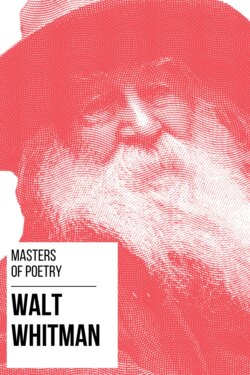Читать книгу Masters of Poetry - Walt Whitman - August Nemo, John Dos Passos, Ellen Glasgow - Страница 4
На сайте Литреса книга снята с продажи.
II
ОглавлениеI first became acquainted with Whitman's poetry through the columns of the old "Saturday Press" when I was twenty or twenty-one years old (1858 or 1859). The first things I remember to have read were "There was a child went forth," "This Compost," "As I ebb'd with the Ocean of Life," "Old Ireland," and maybe a few others. I was attracted by the new poet's work from the first. It seemed to let me into a larger, freer air than I found in the current poetry. Meeting Bayard Taylor about this time, I spoke to him about Whitman. "Yes," he said, "there is something in him, but he is a man of colossal egotism."
A few years later a friend sent me a copy of the Thayer & Eldridge edition of "Leaves of Grass" of 1860. It proved a fascinating but puzzling book to me. I grazed upon it like a colt upon a mountain, taking what tasted good to me, and avoiding what displeased me, but having little or no conception of the purport of the work as a whole. I found passages and whole poems here and there that I never tired of reading, and that gave a strange fillip to my moral and intellectual nature, but nearly as many passages and poems puzzled or repelled me. My absorption of Emerson had prepared me in a measure for Whitman's philosophy of life, but not for the ideals of character and conduct which he held up to me, nor for the standards in art to which the poet perpetually appealed. Whitman was Emerson translated from the abstract into the concrete. There was no privacy with Whitman; he never sat me down in a corner with a cozy, comfortable shut-in feeling, but he set me upon a hill or started me upon an endless journey. Wordsworth had been my poet of nature, of the sequestered and the idyllic; but I saw that here was a poet of a larger, more fundamental nature, indeed of the Cosmos itself. Not a poet of dells and fells, but of the earth and the orbs. This much soon appeared to me, but I was troubled by the poet's apparent "colossal egotism," by his attitude towards evil, declaring himself "to be the poet of wickedness also;" by his seeming attraction toward the turbulent and the disorderly; and, at times, by what the critics had called his cataloguing style of treatment.
When I came to meet the poet himself, which was in the fall of 1863, I felt less concern about these features of his work; he was so sound and sweet and gentle and attractive as a man, and withal so wise and tolerant, that I soon came to feel the same confidence in the book that I at once placed in its author, even in the parts which I did not understand. I saw that the work and the man were one, and that the former must be good as the latter was good. There was something in the manner in which both the book and its author carried themselves under the sun, and in the way they confronted America and the present time, that convinced beyond the power of logic or criticism.
The more I saw of Whitman, and the more I studied his "Leaves," the more significance I found in both, and the clearer it became to me that a new type of a man and a new departure in poetic literature were here foreshadowed. There was something forbidding, but there was something vital and grand back of it. I found to be true what the poet said of himself,—
"Bearded, sunburnt, gray-neck'd, forbidding, I have arrived,
To be wrestled with as I pass for the solid prizes of the universe,
For such I afford whoever can persevere to win them,"—
I have persevered in my study of the poet, though balked many times, and the effect upon my own mental and spiritual nature has been great; no such "solid prizes" in the way of a broader outlook upon life and nature, and, I may say, upon art, has any poet of my time afforded me. There are passages or whole poems in the "Leaves" which I do not yet understand ("Sleep-Chasings" is one of them), though the language is as clear as daylight; they are simply too subtle or elusive for me; but my confidence in the logical soundness of the book is so complete that I do not trouble myself at all about these things.
